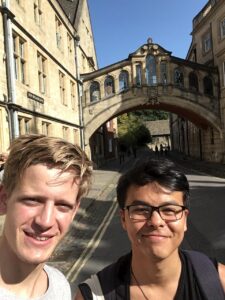This blog post is mainly written to shed some light on how my process of applying to the Master of Philosophy in Economics at the University of Oxford looked like. My hope is that this post will make the process of applying to prestigious universities abroad seem a bit less daunting and perhaps even encourage some of you to actually give it a shot!
My half-hearted decision to apply to the University of Oxford during my last year of high school resulted in a rejection that fuelled me and took me to where I am today. Unlike many other applicants, I had just decided on a whim in September that I was going to apply to the world-renowned (or something like that) course in politics, philosophy, and economics – PPE. After having spent the minimal possible effort on my personal statement and preparation for the standardized test, the resulting rejection was to be expected.
One does not simply get an offer from Oxford with an offhanded application and a feeling of “that would probably be quite nice”. They want something approximating excellence. And excellence does not happen by chance. It is a by-product of hard work, dedication, and true passion for your subject.
As some life-coach once said: “To achieve results that 99% don’t achieve, you have to do things that 99% don’t do.” With that in mind, I adopted a different mindset that, hopefully, would put me in a better position to apply after my undergraduate degree. Here’s a brief snapshot of my journey.
Undergraduate vs Graduate applications to Oxbridge
The application process to taught courses at the graduate level at Oxford differs from the undergraduate process in a couple of crucial ways. First, you write one statement of purpose to each course you apply to whereas undergraduate applicants send in only one statement for all universities and courses they apply to. Second, you can apply to multiple courses and you can apply to both Oxford and Cambridge which is not possible as an undergrad. Third, you are required to provide two to three academic references. Fourth, you have to provide a/several writing sample(s). Fifth, there are no interviews. Lastly, your application is processed and considered by the departments rather than the colleges.
So what did I do?
Let’s split this up in long term, medium-term and when I started to work on the actual application.
My long-term preparation was to, of course, work hard and do my best to receive top marks in all my economics courses (papers). But I want to emphasize that I did not get top grades in all my subjects. I also know that Lund University is relatively unknown. With this in mind, I set my sights on the exchange programme with University of California which not only would be a valuable experience in itself but also a significant boost to my application if I could maintain good grades and get strong recommendation letters from professors there. So I applied and got accepted to the Lund University to UC Berkeley one-year exchange programme.
The medium-term preparation (a year before application opened) for me was everything I did during my year at Berkeley. I immediately began looking for research assistance opportunities at Berkeley. A combination of persistence and luck led to me becoming a part of a research team developing a new index for measuring social progress (the Sustainable Shared-Prosperity Policy Index). I was actively participating during lecture and talked with the professor after class and told her I had applied to the research project. A couple of days after she sent an email asking if I wanted to join the team.
As the end of the spring semester approached, I began discussing my plans to apply to some masters programme with professors. I asked them for both advice on where to apply, what to think about and if they could write me a letter of recommendation. I also began writing down and memorising new English words that I stumbled upon, preparing for the GRE verbal section. I bought GRE preparation material when summer came around and begun reading “Cracking the GRE” by Princeton review.
The application process itself started when I booked my GRE test. This costs around $260 and the only location you can write it in Scandinavia is in Copenhagen. Many say that the GRE is not too difficult, and I’ve heard that people start seriously preparing a month in advance, which I also did. Some need more time, some need less. However, doing so while studying my first course in mathematical analysis and linear algebra wasn’t ideal. My first GRE sitting went poorly for a number of reasons. I did not practice on a digital platform so I was not used to reading questions on a computer, I practised using tons of scrap paper which was a strategy not possible at the test centre and I was just not used to the fast-paced high-stress exam situation (exams in Lund are 5 hours, thus ensuring that stress tolerance isn’t the bottleneck for a student’s performance). There was also some test-centre procedural errors which eventually meant that I could retake the test for half the price. What I did after my first attempt was that I bought a membership at online platform GRE prep scholar (the cheapest out there). That was very good and definitely worth the $38 I paid. I also bought some of the official ETS prep material for the quantitative section.
The statment of purpose
I began jotting down ideas for my statement of purpose in September in a note on my phone so that I would have fragments of a text as I started composing my text. I also contacted some of my former graduate student instructors from Berkeley to ask for advice and to ask if I could see the statement of purpose that got them accepted to the PhD programme at Berkeley. I made a Google sheets with all the programs I was considering: deadlines, requirements and other information.
My most important advice when it comes to your statement of purpose is to start early, ask for feedback and write many drafts. Writing a good statement of purpose is a science in a sense and so I believe there is a formula to it. Roughly speaking, you want to start off strong with an attention-grabbing first sentence before proceeding with a coherent story that weaves in your academic interests in (an intellectual-sounding manner) with other relevant experiences such as being a research assistant. It should all convey that a) you know what you’re talking about, b) you have a genuine passion for your subject that goes beyond lecture content, c) you have the academic merits and adequate knowledge to succeed at Oxford. Note that it is not a personal statement which is what you would write when applying for an undergraduate degree in the US. I wrote about my thesis, my research assistance work at Berkeley and I explained my interest in Herman Daly’s “Steady State Economics”. I explicitly emphasized my mathematical background as I had enrolled in the BSc in mathematics the very same fall.
So to summarize this post. Get good grades. Make good impressions on your professors and they’ll write brilliant references for you. Start jotting down ideas for your statement of purpose early to make the writing process easier. Get the official ETS prep material. Write, ask for feedback, and revise your statement of purpose many times. Seeing some successful sample statements may be useful. Lastly, feel free to contact me if you want advice. I’m happy to have chat about this.


